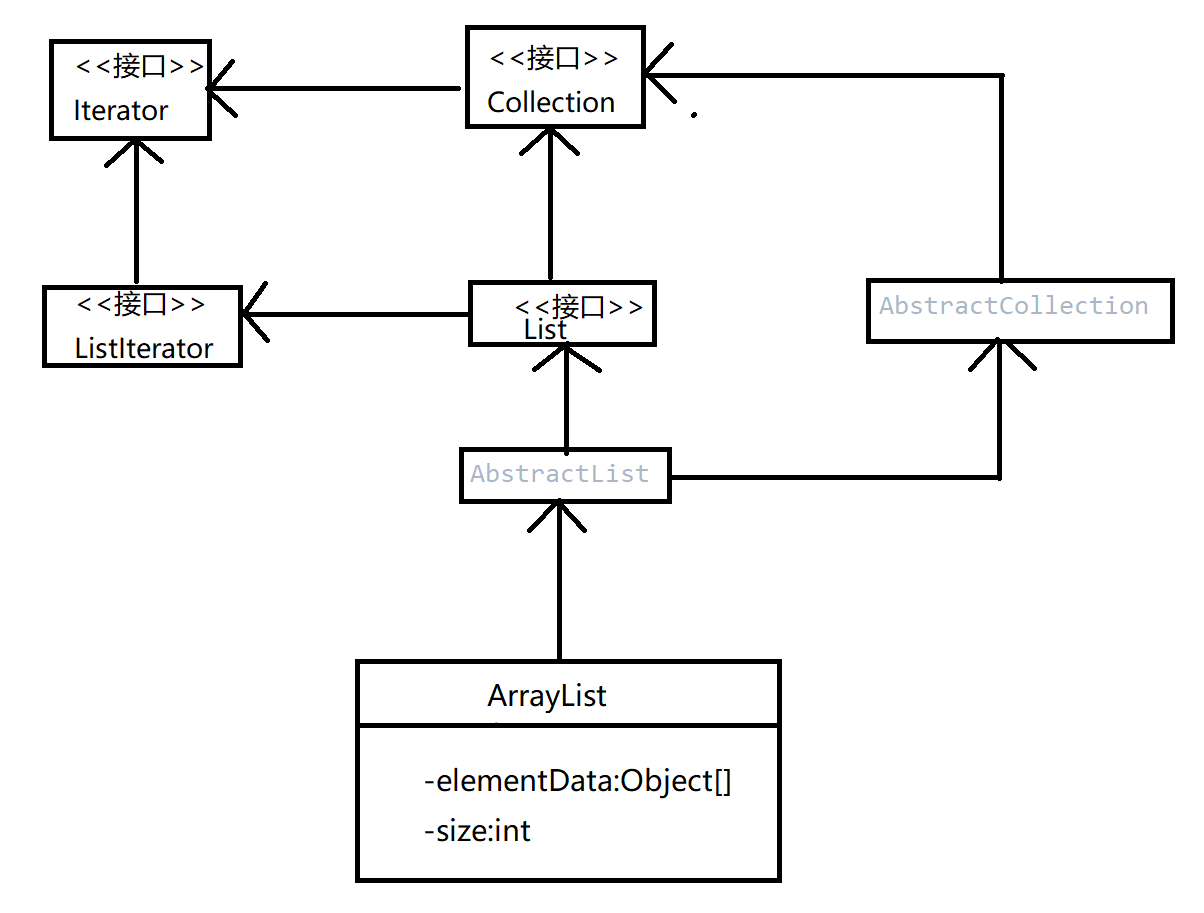ArrayList源码解读

arraylist初始属性
/** * Default initial capacity. */ private static final int DEFAULT_CAPACITY = 10;//初始化长度 /** * Shared empty array instance used for empty instances. */ private static final Object[] EMPTY_ELEMENTDATA = {};//当且仅当容量为0时,返回该空数组 /** * Shared empty array instance used for default sized empty instances. We * distinguish this from EMPTY_ELEMENTDATA to know how much to inflate when * first element is added. */ private static final Object[] DEFAULTCAPACITY_EMPTY_ELEMENTDATA = {};//默认返回的数组 /** * The array buffer into which the elements of the ArrayList are stored. * The capacity of the ArrayList is the length of this array buffer. Any * empty ArrayList with elementData == DEFAULTCAPACITY_EMPTY_ELEMENTDATA * will be expanded to DEFAULT_CAPACITY when the first element is added. */ transient Object[] elementData; // non-private to simplify nested class access//第一次保存元素时,数组会扩容 /** * The size of the ArrayList (the number of elements it contains). * * @serial */ private int size;//arraylist实际大小
从上我们可以知道Array List底层是个数组,它有扩容这个概念,所以可以实现动态增长
构造方法
/** * Constructs an empty list with the specified initial capacity. * * @param initialCapacity the initial capacity of the list * @throws IllegalArgumentException if the specified initial capacity * is negative */ //指定初始化长度initialCapacity public ArrayList(int initialCapacity) { if (initialCapacity > 0) { this.elementData = new Object[initialCapacity]; } else if (initialCapacity == 0) { this.elementData = EMPTY_ELEMENTDATA; } else { throw new IllegalArgumentException("Illegal Capacity: "+ initialCapacity); } } /** * Constructs an empty list with an initial capacity of ten. */ //默认返回DEFAULTCAPACITY_EMPTY_ELEMENTDATA public ArrayList() { this.elementData = DEFAULTCAPACITY_EMPTY_ELEMENTDATA; } /** * Constructs a list containing the elements of the specified * collection, in the order they are returned by the collection's * iterator. * * @param c the collection whose elements are to be placed into this list * @throws NullPointerException if the specified collection is null */ public ArrayList(Collection<? extends E> c) { elementData = c.toArray(); if ((size = elementData.length) != 0) { // c.toArray might (incorrectly) not return Object[] (see 6260652) if (elementData.getClass() != Object[].class) elementData = Arrays.copyOf(elementData, size, Object[].class); } else { // replace with empty array. this.elementData = EMPTY_ELEMENTDATA; } }
add()方法
Ⅰ add(E e)
首先检查是否需要扩容,在进行数据插入
/** * Appends the specified element to the end of this list. * * @param e element to be appended to this list * @return <tt>true</tt> (as specified by {@link Collection#add}) */ public boolean add(E e) { ensureCapacityInternal(size + 1); // Increments modCount!!// elementData[size++] = e; return true; }
先看一下扩容检查方法
private void ensureCapacityInternal(int minCapacity) { ensureExplicitCapacity(calculateCapacity(elementData, minCapacity)); } private static int calculateCapacity(Object[] elementData, int minCapacity) {
//当数据为空时,从minCapacity和DEFAULT_CAPACITY取最小值为数组长度 if (elementData == DEFAULTCAPACITY_EMPTY_ELEMENTDATA) { return Math.max(DEFAULT_CAPACITY, minCapacity); }
//否则直接返回minCapacity return minCapacity; } private void ensureExplicitCapacity(int minCapacity) { modCount++; //若最小值比数组长度大,则使用grow进行扩容操作 // overflow-conscious code if (minCapacity - elementData.length > 0) grow(minCapacity); }
扩容操作
/** * Increases the capacity to ensure that it can hold at least the * number of elements specified by the minimum capacity argument. * * @param minCapacity the desired minimum capacity */ private void grow(int minCapacity) { // overflow-conscious code int oldCapacity = elementData.length; int newCapacity = oldCapacity + (oldCapacity >> 1);//扩容原数组的1.5倍 if (newCapacity - minCapacity < 0) newCapacity = minCapacity; if (newCapacity - MAX_ARRAY_SIZE > 0) newCapacity = hugeCapacity(minCapacity); // minCapacity is usually close to size, so this is a win: elementData = Arrays.copyOf(elementData, newCapacity);//将原数组中的值使用Arrays的copyOf方法存入新数组 }
copyOf()方法
public static <T,U> T[] copyOf(U[] original, int newLength, Class<? extends T[]> newType) { @SuppressWarnings("unchecked") T[] copy = ((Object)newType == (Object)Object[].class) ? (T[]) new Object[newLength] : (T[]) Array.newInstance(newType.getComponentType(), newLength); System.arraycopy(original, 0, copy, 0, Math.min(original.length, newLength)); return copy; }
即add方法基本实现:过程中首先判断数组容量是否足够,足够直接添加;否则进行扩容操作,minCapacity
Ⅱ add(int index, E element)
/** * Inserts the specified element at the specified position in this * list. Shifts the element currently at that position (if any) and * any subsequent elements to the right (adds one to their indices). * * @param index index at which the specified element is to be inserted * @param element element to be inserted * @throws IndexOutOfBoundsException {@inheritDoc} */ public void add(int index, E element) { rangeCheckForAdd(index);//检查是否越界 ensureCapacityInternal(size + 1); // Increments modCount!!//扩容 System.arraycopy(elementData, index, elementData, index + 1, size - index);//插入 elementData[index] = element; size++; }
get()
/**
* Returns the element at the specified position in this list.
*
* @param index index of the element to return
* @return the element at the specified position in this list
* @throws IndexOutOfBoundsException {@inheritDoc}
*/
public E get(int index) {
rangeCheck(index);//检查角标
return elementData(index);//返回元素
}
/** * Checks if the given index is in range. If not, throws an appropriate * runtime exception. This method does *not* check if the index is * negative: It is always used immediately prior to an array access, * which throws an ArrayIndexOutOfBoundsException if index is negative. */ private void rangeCheck(int index) { if (index >= size) throw new IndexOutOfBoundsException(outOfBoundsMsg(index)); }
E elementData(int index) {
return (E) elementData[index];
}
set()
/** * Replaces the element at the specified position in this list with * the specified element. * * @param index index of the element to replace * @param element element to be stored at the specified position * @return the element previously at the specified position * @throws IndexOutOfBoundsException {@inheritDoc} */ public E set(int index, E element) { rangeCheck(index);//检查角标 //替换,返回旧值 E oldValue = elementData(index); elementData[index] = element; return oldValue; }
remove()
/** * Removes the element at the specified position in this list. * Shifts any subsequent elements to the left (subtracts one from their * indices). * * @param index the index of the element to be removed * @return the element that was removed from the list * @throws IndexOutOfBoundsException {@inheritDoc} */ public E remove(int index) { rangeCheck(index);//检查角标 modCount++; E oldValue = elementData(index); //左移位数 int numMoved = size - index - 1; if (numMoved > 0) System.arraycopy(elementData, index+1, elementData, index, numMoved); elementData[--size] = null; // clear to let GC do its work//设置null让gc回收 return oldValue; }
从上边我们可以看出ArrayList时基于动态数组实现的,在增删的时候,需要数组进行拷贝复制(System.arrayCopy()效率最高的数组拷贝)
Array List默认数组长度为10,每次扩容增加原来的一半。
删除元素时不会减少容量,若需要减少容量则需要调用trimToSize()


